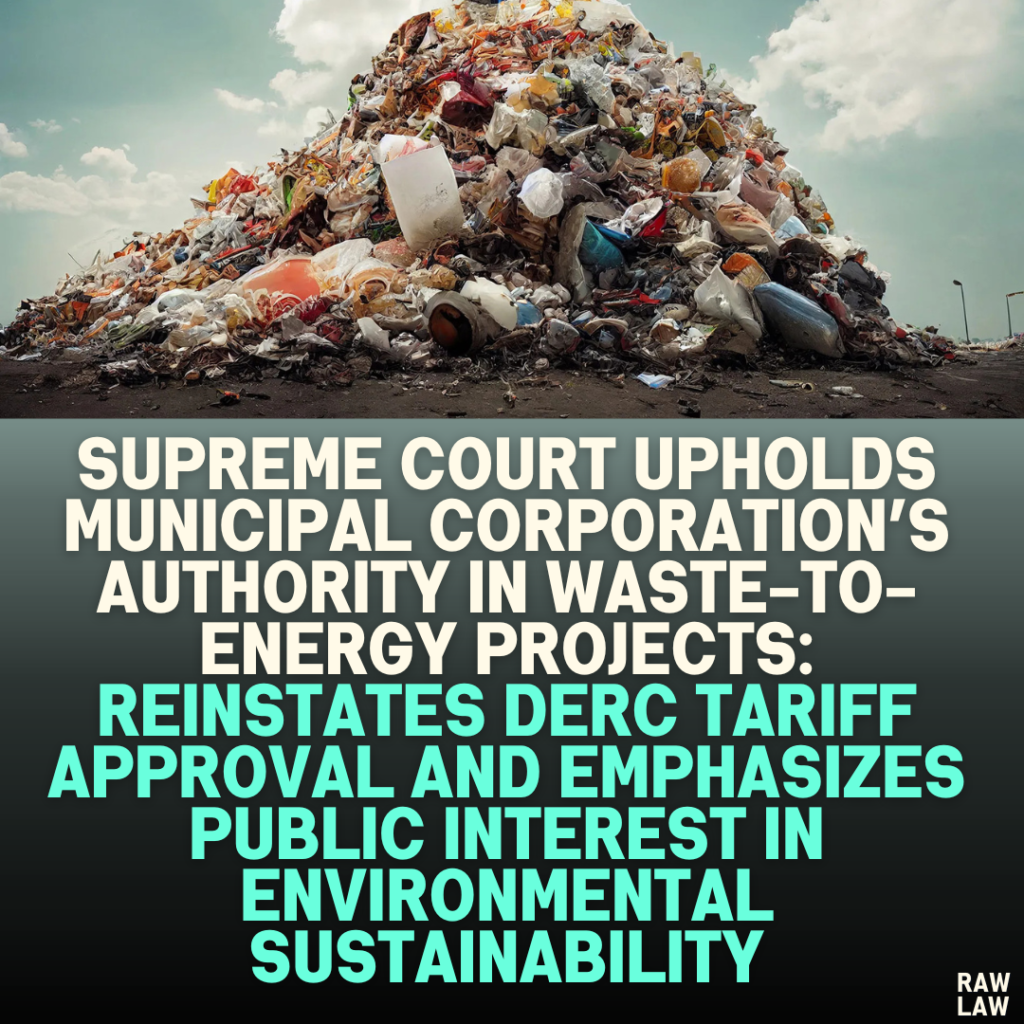1. Court’s Decision
The Supreme Court overturned the judgment of the Appellate Tribunal for Electricity (APTEL), reinstating the orders of the Delhi Electricity Regulatory Commission (DERC). These orders:
- Approved the ₹7.38/KWh tariff for a Waste-to-Energy (WTE) project in Narela Bawana, New Delhi.
- Directed Discoms to negotiate a Power Purchase Agreement (PPA) with the lowest bidder, M/s JITF Urban Infrastructure Ltd.
The Court emphasized that MCD’s actions were within its statutory obligations under the Solid Waste Management Rules, 2016, and the Electricity Act, 2003. It ruled that APTEL’s restrictive interpretation of Section 63 of the Electricity Act failed to recognize MCD’s statutory role and ignored larger public interest considerations.
2. Facts of the Case
- Project Background: The Municipal Corporation of Delhi (MCD) sought to set up a 28 MW capacity WTE project to process 3,000 tons per day (TPD) of municipal solid waste. A Request for Proposal (RfP) was issued for a tariff-based bidding process.
- DERC’s Role: After receiving the lowest bid from M/s JITF Urban Infrastructure Ltd., DERC approved the ₹7.38/KWh tariff and directed Discoms to finalize the PPA terms.
- APTEL Judgment: APTEL invalidated DERC’s orders, holding that MCD, not being a distribution licensee or generating company, lacked jurisdiction to seek tariff approval under Section 63 of the Electricity Act.
3. Issues
- Does Section 63 of the Electricity Act allow MCD, a local authority, to initiate a tariff approval process for a WTE project?
- Did APTEL err by restricting MCD’s statutory authority and ignoring public interest in managing municipal waste?
4. Petitioner’s Arguments (MCD)
- Statutory Mandate: Under Rule 15 of the Solid Waste Management (SWM) Rules, 2016, MCD is obligated to establish waste processing facilities, including WTE plants.
- Interpretation of Section 63: The section does not restrict tariff approval applications to distribution licensees or generating companies, enabling MCD to act in public interest.
- Transparent Process: The bidding was conducted transparently, meeting the requirements of Section 63 and DERC guidelines.
- National Tariff Policy Compliance: Rule 6.4 mandates Discoms to procure 100% of power generated by WTE plants, supporting DERC’s approval of the bidding process.
5. Respondent’s Arguments (Challenging MCD’s Role)
- Jurisdiction: Only generating companies or distribution licensees can invoke Section 63 of the Electricity Act for tariff adoption.
- Policy Guidelines: WTE projects require specific bidding guidelines from the Ministry of Power, which were absent. Hence, DERC exceeded its authority by approving the process.
6. Analysis of the Law
- Solid Waste Management Rules, 2016:
- Rule 15 mandates local authorities to facilitate WTE projects using suitable technologies. MCD’s role in initiating the project aligns with its statutory responsibilities.
- These rules prioritize decentralized waste processing to minimize environmental impact.
- Electricity Act, 2003 – Section 63:
- Section 63 enables the Appropriate Commission to adopt a tariff determined through a transparent bidding process.
- The Court found no language in Section 63 limiting its applicability to generating companies or Discoms.
- National Tariff Policy (NTP), 2016:
- Rule 6.4 requires Discoms to procure 100% power from WTE plants.
- DERC’s approval of the tariff and direction to Discoms to enter a PPA was consistent with this policy.
- Harmonious Construction:
- The Supreme Court emphasized the need to read Section 63 with other relevant provisions, such as Section 86(1)(b), which empowers State Commissions to regulate electricity procurement processes.
7. Precedent Analysis
The Court referred to multiple judgments:
- Energy Watchdog v. CERC: Established that regulatory commissions could exercise powers in the absence of central guidelines.
- Jaipur Vidyut Vitran Nigam Ltd. v. MB Power: Highlighted the role of State Commissions in balancing consumer and generator interests.
- Pune Municipal Corporation v. Sus Road Baner Vikas Manch: Recognized municipal corporations’ statutory duties in waste management.
8. Court’s Reasoning
- Statutory Obligations of MCD:
MCD was fulfilling its duty under Rule 15 of the SWM Rules by initiating the WTE project. The Court noted that this obligation cannot be curtailed by technical restrictions. - Interpretation of Section 63:
The Court held that APTEL erred by interpreting Section 63 narrowly. It emphasized:- The section does not exclude local authorities from seeking tariff approval.
- A plain reading allows any entity conducting a transparent bidding process to approach the Appropriate Commission.
- Public Interest:
- The project addressed a critical issue of waste management in Delhi, which is in the larger public interest.
- APTEL overlooked the environmental and social benefits of the project.
- Role of DERC:
- DERC’s approval followed a thorough evaluation of bids and adherence to transparency requirements.
- The Court affirmed DERC’s findings that MCD acted within its statutory framework.
9. Conclusion
- The Supreme Court allowed the appeals, quashing APTEL’s judgment.
- DERC’s orders approving the tariff and bidding process were reinstated.
10. Implications
- Affirmation of Local Authority Role:
Municipal bodies can now play a pivotal role in infrastructure projects under their statutory obligations, even in the absence of specific guidelines. - Regulatory Commissions’ Flexibility:
The judgment reinforces the flexibility of regulatory commissions to approve processes in the public interest. - Encouragement for WTE Projects:
The ruling promotes waste management initiatives, aligning environmental protection with energy generation.
The judgment underscores the balance between statutory duties, environmental sustainability, and regulatory oversight, offering a roadmap for similar projects across India.




Pingback: Supreme Court Resolves Jain Religious Trust Dispute: Enforces Mediation Settlement Finalizing ₹8.11 Crores Compensation and Ownership of Temples in Ajmer - Raw Law